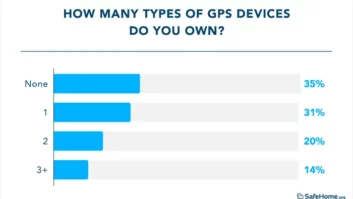Fans of GPS technology might want to think long and hard before giving thanks for the driving convenience and business opportunities this technology has afforded them in recent years.
According to privacy advocates, the technology could one day soon be used (abused?) by potential Big Brother government types, courtesy of taxpayer dollars, for all sorts of nefarious purposes right here at home. The danger begins upon completion of the 2010 Census (coming your way March 1, 2010), which for the first time is gathering the coordinates of 135 million U.S. front doors, using GPS technology.
As part of a $700 million taxpayer-funded contract, a Federal project called Local Update of Census Addresses (LUCA) has hired 140,000 workers to develop a master address file including these GPS readings for every residence in the nation.
The data will be gathered in the 2010 Census to enable pinpointing locations, raising the suspicions and ire of privacy advocates, who worry about how such information will be used.
Why the fuss? For starters, privacy advocates point out that information on race was provided by the Census Bureau during World War II to locate and round up Japanese-American citizens for interment.
“Now we know that the Department of Homeland Security obtained information on people who identified themselves as being of Arab ancestry during the 2000 census and used that, apparently, to identify the locations of Arab-Americans living in this country after Sept. 11,” Katherine Albrecht, privacy advocate and co-founder of Consumers Against Supermarket Privacy Invasion and Numbering (CASPIAN), said last week in an interview with nationally syndicated radio program Coast To Coast AM.
This came despite the fact that Title 13, which authorizes the census, specifically prohibits the use of such information for any other reason than taking the count. Supposedly, the bureau is barred from disclosing the information to any other agency or individual.
However, in addition to Homeland Security, programs exist that allow certain researchers access to detailed “block-level information” gathered from the files, Albrecht said.
But don’t worry. The last prosecution for improperly divulging information gathered in the census was just 50 years ago.
The LUCA workers are now going door to door to every residence in the country armed with special handheld GPS units, which with the push of a button will communicate with GPS satellites, triangulate the location they are standing in (within 40 feet of the front door), and spit out longitude and latitude coordinates to mark that location.
Instances of census takers walking past closed gates, fences and no-trespassing signs in past census years have been reported to privacy advocates.
The GPS plan has been in the works since 2007, but the Obama administration apparently gave its seal of approval in a recent decision to put White House Chief of Staff Rahm Emanuel in a census oversight role.
In addition to gathering GPS coordinates, the 140,000 LUCA workers are to confirm addresses that have previously been gathered in a master file from congressional district data and postal records.
But the fun just keeps on coming. Starting March 1, 2010, residents will be sent newly designed census questionnaires, which are to be offered in two forms — a basic standard sheet and a detailed form called the American Community Survey.
Privacy advocates said both forms ask for detailed personal information but the American Community Survey continues the level of detail that was asked in “the long form” questionnaire that drew outrage in the last census 10 years ago. The basic form asks such questions as whether your housing unit is owned or rented; your telephone number; the number of people who live in the residence; if any additional people will live in the residence on or after April 1, 2010 (the date the census forms come due); your full name, age, gender and date of birth; the relationship to the person who owns or rents the home; race, including whether or not someone is of Hispanic heritage; and whether or not a person in the house sometimes stays or lives someplace else.
The accompanying American Community Survey goes further, asking about an occupant’s commute, income level and even household plumbing.
About the only information the Census Bureau is told it cannot collect is religious affiliation. (Thank God for that!)
Failure to return the questionnaires can result in a $100 fine, knowingly falsifying information will result in a $500 fine, and if forms are not returned after a second mailing, a census taker will be sent to the residence to gather the information on site.
Simply refusing to answer the questions of census takers could send these agents to friends and neighbors to gather the information they were refused.
Did I miss something? When did the land of the free, home of the brave get on this side of the Iron Curtain?













